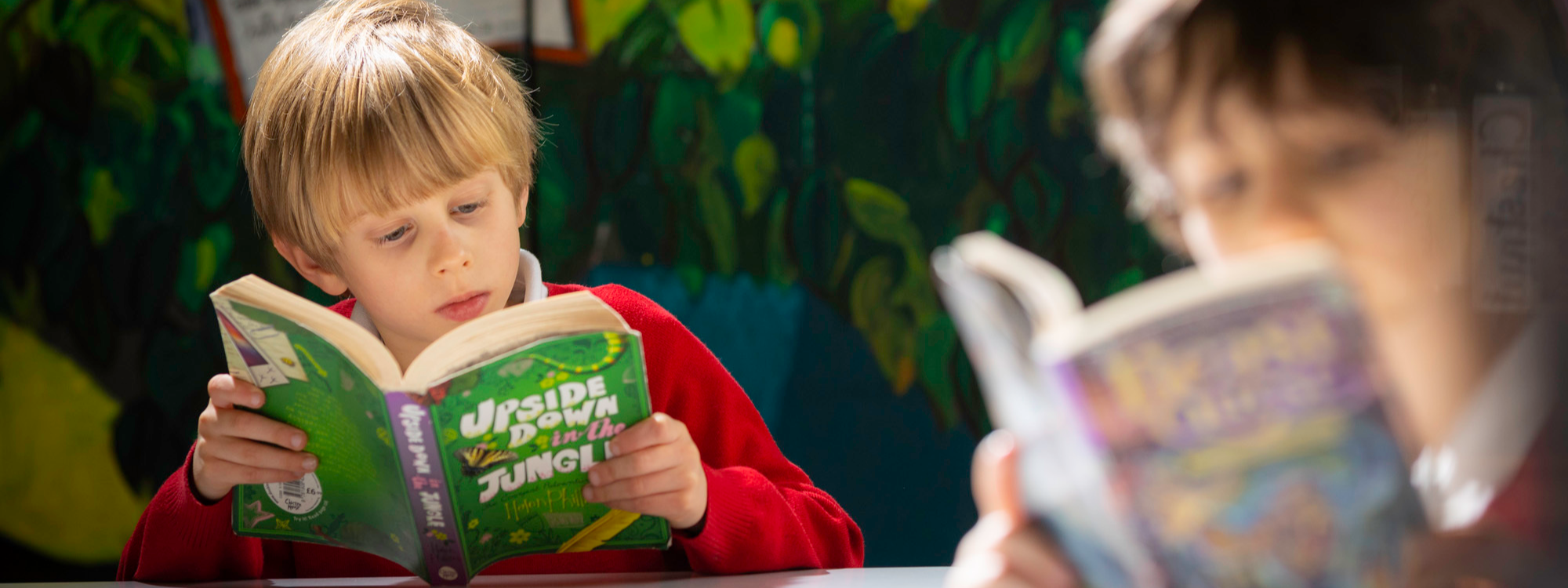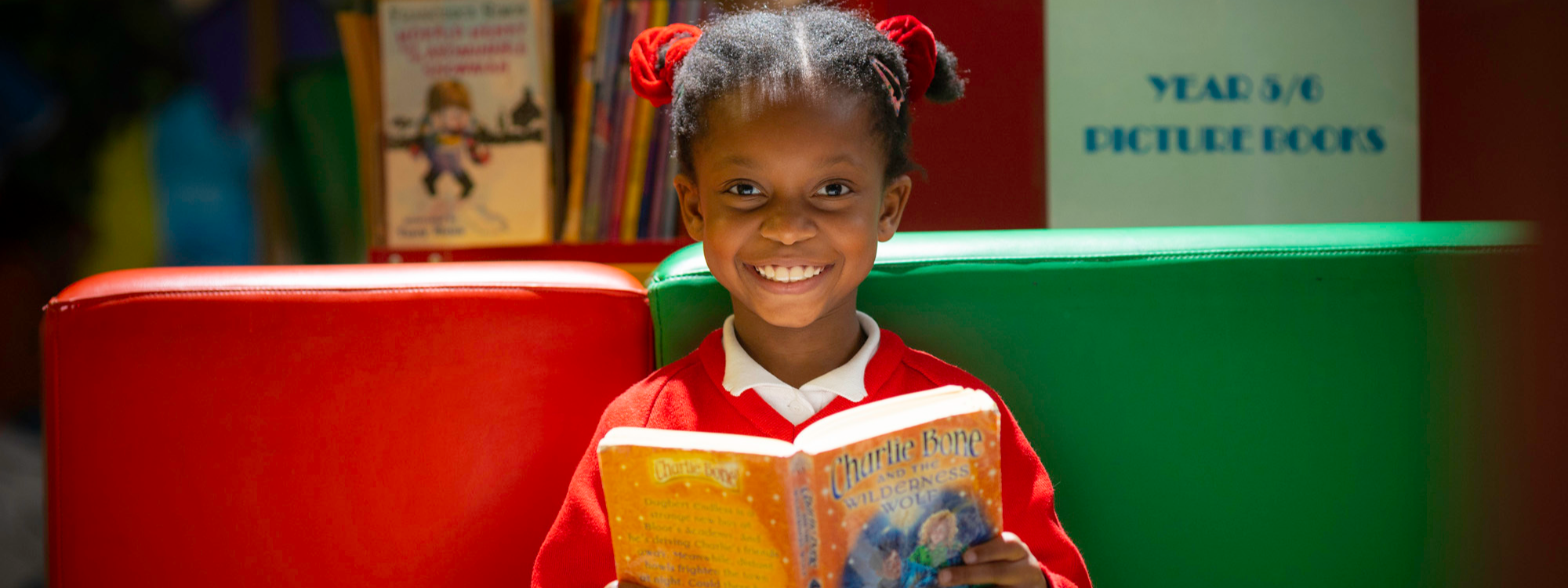- Home
- About Us
- Curriculum
- Subjects
- English
English
BackReading
At Alexandra Junior School, we want every child to be able to read and every child to love books. We firmly believe that by mastering the art of reading, fostering an appreciation for it, and nurturing a love for books, we empower our pupils to excel across all facets of the curriculum, thereby exponentially enhancing their potential for success in life.
The teaching of reading is a cornerstone of a child's comprehension and appreciation of the world that surrounds them. It serves as a gateway, enabling our pupils to explore beyond their immediate experiences, engage with diverse cultures, and develop the vocabulary necessary for effective self-expression. Our reading curriculum is meticulously designed to instill a lifelong passion for reading, cultivating the habits that will mould our pupils into discerning and avid readers who immerse themselves in books on a regular and extensive basis.
Vocabulary development is a central tenet not only within English but across the entire curriculum. We understand that a rich vocabulary greatly enhances a reader's ability to comprehend texts.
Pupils are guided in developing the strategies necessary to comprehend what they read, interpret texts, and extract information. This includes cultivating an awareness of authorial intent, recognising genre purposes, and understanding the literary devices used to create impact.
Prosody, involving intonation, fluency, and expression, is another integral component of our reading curriculum. Prosody not only provides readers with insight into how reading for meaning should sound but also demonstrates how books can come to life through readers and how words on the page can evoke vivid imagery.
Beyond the essential skills and strategies in reading our primary aim is to ignite in our pupils a genuine desire and passion for reading. At the heart of our curriculum lies "Reading for Pleasure," a key driver of educational outcomes for all our pupils. We are deeply committed to promoting a love for reading, as well as a culture of reading in the school, and strive to offer pupils opportunities to read not only in English lessons but also throughout the broader curriculum. We understand that while academic achievement is vital, the benefits of reading for pleasure extend far beyond, influencing every facet of an individual's lifelong journey.
Research demonstrates that reading for pleasure yields numerous advantages, including fostering understanding, aiding learning, providing comfort and solace, building confidence, enabling self-expression, enhancing self-understanding, nurturing empathy, improving interpersonal relationships, and promoting overall well-being. It is imperative that pupils are motivated to read regularly at home, as increased reading opportunities lead to improved fluency and stamina, ultimately heightening their enjoyment of reading. The relationship between a pupil's motivation to read and reading for pleasure is reciprocal. Moreover, we recognise that reading for pleasure not only benefits reading outcomes but also enhances broader enjoyment of learning and mental well-being.
Our AJS Vision and Philosophy of Reading document further outlines our approach to reading.
Phonics
The phonics instruction at our school should be seen in the context of our wider vision and philosophy for reading:
At Alexandra Junior School, we want every child to read and every child to love books.
In order to provide the best opportunities for the learning of reading, we are using evidence based research to inform our teaching of reading. By using the philosophies of reading experts such as Christopher Such and the research from the EEF, we are developing our reading curriculum to support the development of children’s understanding of language and literacy by guiding them through a sequence of hierarchical skills and basing our learning of reading on a single text across a week. A carefully chosen and challenging text provides discussion about language as well as content. The text may take many forms. For example, it might be taken from a current topic, be fictional, non-fiction, a form of poetry or a picture book or film clip. Multiple readings of the same text provide opportunities for:
• Increased fluency in reading including prosody (the patterns of stress and intonation used by the reader)
• Discussion of unfamiliar vocabulary
• Discussion of unfamiliar contexts and themes within the text
• Increased comprehension.
As we are a Junior School, our phonics instruction is grounded in the systematic synthetic program known as "Little Wandle Rapid-Catch-Up" and supports pupils through small group intervention sessions. This comprehensive program takes a multi-sensory approach, incorporating letter frames, flashcards, phonic games, and listening activities to engage our pupils effectively.
Within the framework of "Little Wandle Rapid-Catch-Up", each phonics session adheres to a consistent structure. It encompasses the key stages of introduction, revision, and review, followed by the teaching phase, ample opportunities for practice, and real-world application. This structured approach ensures that pupils not only acquire new phonetic sounds but also seamlessly integrate these sounds into their reading of unfamiliar words. Throughout these sessions, pupils actively engage in decoding, segmenting, and blending exercises, all while becoming proficient in using subject-specific technical vocabulary such as "phoneme" and "digraph." Our lessons are thoughtfully tailored to meet the specific needs of our pupils, informed by ongoing phonics assessments, which in turn guide our planning and streaming within year groups.
Rapid Catch-up lessons use the same content as the core Little Wandle programme delivered at a quicker pace, which has a positive impact. Lessons are embedded in reading with optional Big Cat for Little Wandle Letters and Sounds Revised 7+ books available. These ensure older children can grow their language and become fluent readers, using texts which appeal to their growing understanding.
Writing
At Alexandra Junior School, we hold the firm belief that writing is an essential life skill, with applications both inside and outside of the realm of education. This conviction drives our commitment to infuse the art of writing throughout every subject we teach. Our primary objective is to equip children with the fundamental, transferable writing skills that will serve as a solid foundation year after year, ensuring their preparedness for the challenges of secondary school and beyond.
Our approach to teaching writing is infused with excitement, where we employ a variety of engaging methods to captivate the imaginations of our young learners. We firmly advocate that all children should possess the confidence to articulate their knowledge, ideas, and emotions through the written word. Our writing curriculum is meticulously designed to instill the ability to plan, draft, and refine written work over time, fostering independence by encouraging pupils to identify areas for improvement on their own.
Our goal extends to enabling children to confidently spell new words, achieved through the effective application of spelling patterns and rules they acquire during their primary school journey. Clarity, accuracy, coherence, and creativity are paramount in their writing, with adaptability in language and style to suit various contexts, purposes, and audiences.
In our writing curriculum, we prioritise oracy to enrich vocabulary and enhance comprehension of more complex texts featured across our curriculum. Through engaging in discussions, asking questions, and diving into diverse texts, our pupils sharpen their understanding and acquire the tools essential for success in their writing endeavours.
By the culmination of Key Stage 2, our students will have honed their skills to craft impactful writing. They will find joy in sustained writing and possess the ability to deftly manipulate language, grammar, and punctuation to achieve desired effects. Our overarching aspiration is to enable each and every learner to reach their full potential in writing. We remain resolute in our commitment to furnishing them with a curriculum rich in textual diversity, propelling them towards this lofty achievement.
Oracy
Oracy, the development of effective spoken communication skills, holds paramount importance at Alexandra Junior School. It serves as the cornerstone for various facets of a child's growth and development. Oracy skills are the gateway to literacy; by honing children’s ability to express themselves verbally, pupils lay a robust foundation for reading and writing, facilitating their academic journey. It nurtures social interaction, enabling pupils to articulate their thoughts, collaborate with peers, and resolve conflicts, fostering empathy and an appreciation of diverse viewpoints and cultures. Furthermore, oracy promotes critical thinking. Through discussion, pupils learn to analyse information, express their ideas, and evaluate different perspectives, vital for problem-solving and decision-making. Oracy also instils confidence: by speaking in front of peers and actively participating in class discussions, pupils gain self-assurance and leadership skills, which prove invaluable in their personal and academic lives. Additionally, effective oral communication prepares pupils for future careers, as almost every profession demands the ability to communicate ideas clearly and collaborate with colleagues. It nurtures public speaking skills, essential for presentations, interviews, and leadership roles. Our promotion of oracy at Alexandra Junior School equips children with the skills they require for success in academics, social interactions, and future endeavours, ensuring they evolve into informed and engaged global citizens.




